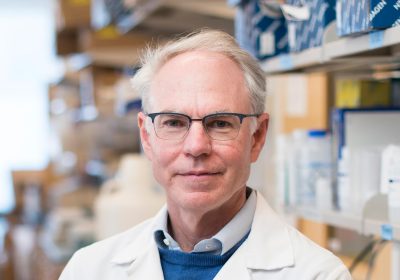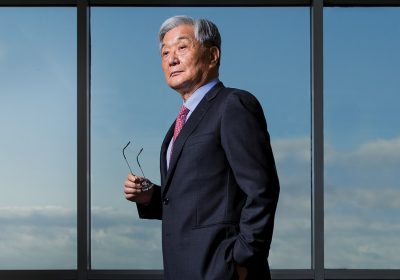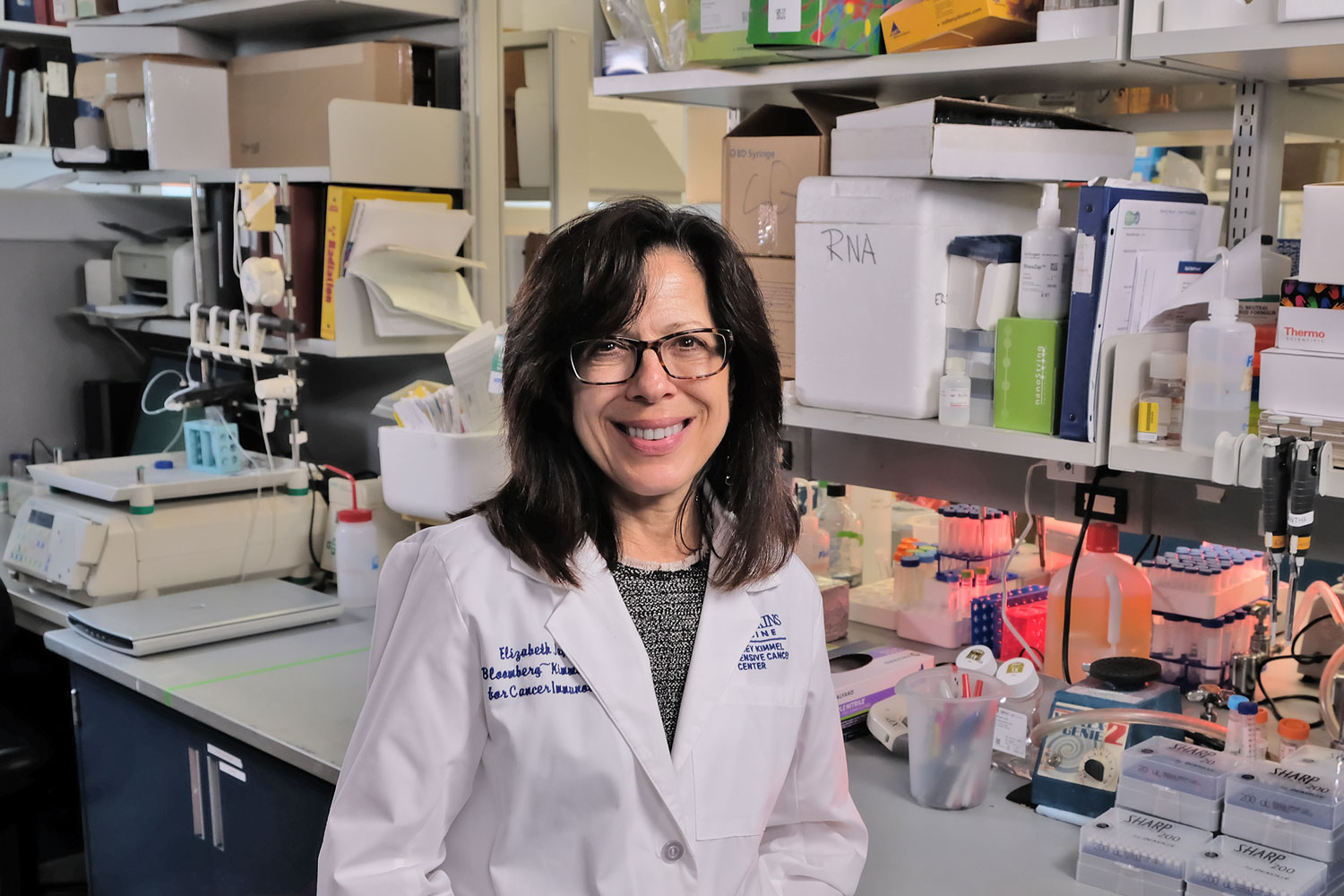
Dr. Elizabeth M. Jaffee Seeks to Have a Lasting Impact
Elizabeth M. Jaffee, MD, still recalls being in the fourth grade when she read the biography of Dr. Marie Curie, the scientist who discovered the elements polonium and radium and became the first woman to win a Nobel Prize and the only woman to win two.
“She pursued her passion and made many discoveries that have had lasting impact,” said Dr. Jaffee, who assumed the role of President of the American Association for Cancer Research (AACR) in April. “I thought to myself, what better way to leave something good to the world even after your die?”
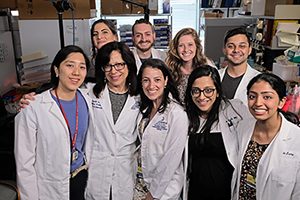
Today, more than five decades after she read the Curie biography, Dr. Jaffee strives to follow in the footsteps of her role model. She is the deputy director of the Sidney Kimmel Comprehensive Cancer Center at Johns Hopkins University in Baltimore and the associate director of the Bloomberg-Kimmel Institute for Cancer Immunotherapy there.
“She has impeccable credentials as a researcher and clinician,” said William G. Nelson, MD, PhD, a long-time colleague of Dr. Jaffee and the director of the Sidney Kimmel Comprehensive Cancer Center. “She also brings to her work as AACR President very successful tenures as a co-chair of the Blue Ribbon Panel of the National Cancer Moonshot Initiative and as a member and the first woman to be the chair of the National Cancer Advisory Board of the National Cancer Institute. She’s impressed everyone with her wisdom and is widely recognized for her talents and skills.”
Margaret Foti, PhD, MD (hc), the AACR’s Chief Executive Officer, is equally enthusiastic about Dr. Jaffee. “Her expertise and vision are invaluable to the AACR as we work together toward our shared goal of defeating all cancers at the earliest possible time,” she said. “Dr. Jaffee is a world-renowned expert in the hottest area of cancer research today—cancer immunotherapy. She has conducted pioneering research that has had and continues to have an enormous impact on the discovery and early clinical development of investigational immunotherapies for several different cancers, most notably, breast and pancreatic cancers.”
An Early Focus on Immunotherapy
Immunotherapy may be a hot topic in cancer research and treatment now, but it’s been the focus of Dr. Jaffee’s work for 25 years. As an undergraduate at Brandeis University in Waltham, Massachusetts, Dr. Jaffee began working in an immunology lab, where she saw early on the potential for using the immune system to fight cancer. That experience led her to make immunotherapy the focus of her career. A few years later, while training as a medical resident, her uncle died of pancreatic cancer, just three months after his diagnosis. “He had been healthy one day and had a death sentence the next,” Dr. Jaffee recalled. “This was devastating to my family and my young cousins. I knew then that I would pursue a career to fight this deadly disease.”
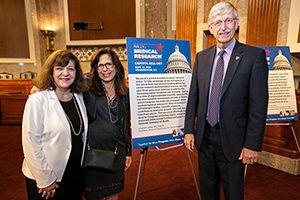
Immunotherapy “is the best example of how years of basic and translational research have led to new therapies that have had an amazing impact on the lives of patients with advanced cancers,” Dr. Jaffee said. “It has also rejuvenated cancer research in general, attracting young people to become the next generation of researchers because of this excitement.”
That she would mention young people makes sense to her colleagues. Dr. Jaffee is widely respected for her work with up-and-coming researchers. “She has been more dedicated to mentoring the next generation of translational researchers than most,” said Dr. Nelson. “She takes that seriously and has an impressive record of achievement among her mentees.”
In fact, when Dr. Jaffee reflects on her career, it’s her work as a mentor for students, postdoctoral fellows, and young faculty that makes her most proud. “I have had the honor to mentor and develop lifelong professional relationships with many talented young scientists,” she said, “I am also proud that I have mentored young women to pursue a career in science.
“Beyond mentorship, I am proud that I have encouraged a whole generation of pancreatic cancer researchers who are now helping to make rapid progress in understanding the biology of this cancer,” she added. “I am confident these ongoing discoveries will provide new therapies for treating this disease in the next decade.”
Presidential Goals
As AACR President, Dr. Jaffee said she intends to “amplify the initiatives” on health disparities and diversity in science that Michael A. Caligiuri, MD, president and physician-in-chief of City of Hope National Medical Center in Duarte, California, began during his AACR presidency in 2017-2018. “I would like to be able to come up with ways to use AACR mechanisms to include a next generation of researchers that will be more diverse and representative of our country,” she said.
Dr. Jaffee also wants to help advance the field of convergence science, which seeks to incorporate insights from computer science, physics, and similar fields into the life sciences. “We need to marry other disciplines with cancer research,” she said of convergence. “I would like to take this to the next level and initiate mechanisms to further encourage engineers, mathematicians, and technologic experts to apply their disciplines to cancer biology problems. We are in the era of big data, and we need expertise from individuals who are thinking about big data problems.”
A Life of Service
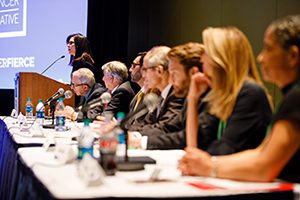
Over the course of her career, Dr. Jaffee has had multiple appointments to committees at Johns Hopkins and has been asked to serve on advisory boards for professional societies and cancer centers. Her involvement with the AACR dates to 1994 and includes serving on the Board of Directors from 2013 to 2016, as chair of the Cancer Immunology Working Group Steering Committee, and as co-chair of the AACR special conferences on tumor immunology in 2010 and 2012. She is also a team leader for the Stand Up To Cancer Pancreatic Dream Team research project, “Transforming Pancreatic Cancer from Death Sentence to Treatable Disease.”
To an outsider, Dr. Jaffee’s one-year term as AACR President might seem to be a natural progression in her career. But for her, it’s one more way to achieve the goal she set for herself in fourth grade: to have a lasting impact.
“I wanted to be President so that I can learn more about the organization and see where I can help with their important mission,” she said. “It is a wonderful organization that facilitates big science with the goal of impacting patients. They are tireless in their efforts to help eradicate all cancers so that we will have a cancer-free future.”



